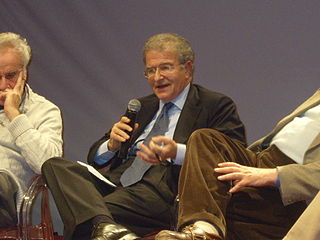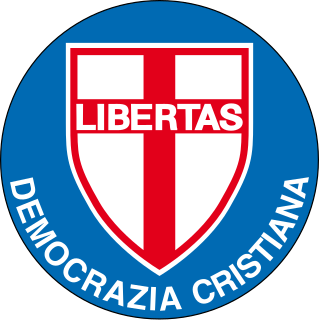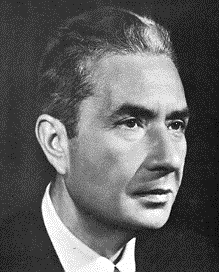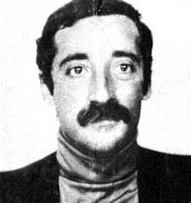
Francesco Cossiga was an Italian politician, member of the Christian Democracy. He served as the 42nd Prime Minister of Italy from 1979 to 1980 and the 8th President of Italy from 1985 to 1992. Cossiga is widely considered one of the most prominent and influential politicians of the so-called First Republic. He has been often described as a strongman and accused of being an "iron minister", who brutally repressed the public protests.

Arnaldo Forlani, is an Italian politician who served as the 43rd Prime Minister of Italy from 18 October 1980 to 28 June 1981. He also held the office of Deputy Prime Minister, Minister of Foreign Affairs and Minister of Defence.

Amintore Fanfani was an Italian politician and the Prime Minister of Italy for five separate runs. He was one of the best-known Italian politicians after the Second World War, and a historical figure of the left-wing section of the Christian Democracy party; he is also considered to have been one of the founders of the Italian centre-left.
The Historic Compromise, called also Third Phase or Democratic Alternative, was an Italian historical political alliance and accommodation between the Christian Democrats (DC) and the Italian Communist Party (PCI) in the 1970s.

Beniamino "Nino" Andreatta was an Italian economist and politician.

Fabrizio Cicchitto is an Italian politician.

General elections were held in Italy on 7 May 1972, to select the Sixth Republican Parliament. Democrazia Cristiana (DC) remained stable with around 38% of the votes, as did the Communist Party (PCI) which obtained the same 27% it had in 1968. The Socialist Party (PSI) continued in its decline, reducing to less than 10%. The most important growth was that of the post-fascist Italian Social Movement, who nearly doubled its votes from 4.5% to about 9%, after its leader Giorgio Almirante launched the formula of the National Right, proposing his party as the sole group of the Italian right wing. After a dismaying result of less than 2%, against the 4.5% of 1968, the Italian Socialist Party of Proletarian Unity was disbanded; a majority of its members joined the PCI.

General elections were held in Italy on 20 June 1976, to select the Seventh Republican Parliament. They were the first after the voting age was lowered to 18.

General elections were held in Italy on 26 June 1983, to select the Ninth Republican Parliament. The Pentaparty formula, the governative alliance between five centrist parties, caused unexpected problems to Christian Democracy. The alliance was fixed and universal, extended both to the national government and to the local administrations. Considering that the election result did not longer depend by the strength of the DC, but by the strength of the entire Pentapartito, centrist electors began to look at the Christian Democratic vote as not necessary to prevent a Communist success. More, voting for one of the four minor parties of the alliance was seen as a form of moderate protest against the government without giving advantages to the PCI. Other minor effects of this election were a reduction of the referendarian Radical Party and the appearance of some regional forces.

General elections were held in Italy on 14 June 1987, to select the Tenth Republican Parliament. This election marked the final inversion of the trend of the entire republican history of Italy: for the first time, the distance between the Christian Democrats and the Communists grew significantly instead of decreasing, and this fact was seen as the result of the deindustrialization of the country. The growth of the service sector of the economy, and the leadership of former PM Bettino Craxi, gave instead a new strength to the Socialists. A remarkable novelty was the rise of the new Green Lists, while a new party obtained its first two parliamentary seats: the Northern League.

General elections were held in Italy on 5 and 6 April 1992 to select the Eleventh Republican Parliament. They were the first without the traditionally second most important political force in Italian politics, the Italian Communist Party (PCI), which had been disbanded in 1991. It was replaced by a more social-democratic oriented force, the Democratic Party of the Left (PDS), and by a minority entity formed by members who did not want to renounce the communist tradition, the Communist Refoundation Party (PRC). However, put together they gained around 4% less than what the already declining PCI had obtained in the 1987 Italian general election, despite PRC had absorbed the disbanded Proletarian Democracy (DP).

The second elections for the European Parliament in Italy were held on 17 June 1984.

Giuseppe Zamberletti was an Italian politician and one of the founders of Italy's Protezione Civile, of which he was the first minister in Italy from 1981.
The Pentapartito, commonly shortened to CAF refers to the coalition government of five Italian political parties that formed between June 1981 and April 1991. The coalition comprised the Christian Democracy (DC) party and four secular parties: the Italian Socialist Party (PSI), Italian Democratic Socialist Party (PSDI), Italian Liberal Party (PLI) and Italian Republican Party (PRI).
The centre-left coalition is a political alliance of political parties in Italy active, under several forms and names, since 1995 when The Olive Tree was formed under the leadership of Romano Prodi. The centre-left coalition ruled the country for more than twelve years between 1996 and 2018.



























